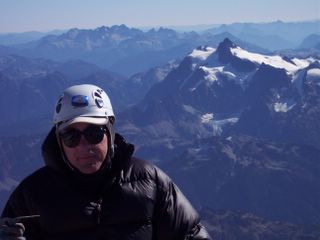Song of the Peach Tree Spring
"My fishing boat sails the river. I love spring in the mountains.
Peach blossoms crowd the river on both banks as far as sight.
Sitting in the boat, I look at red trees and forget how far I’ve come.
Drifting to the green river’s end, I see no one.
Hidden paths wind into the mountain’s mouth.
Suddenly the hills open into a plain
and I see a distant mingling of trees and clouds.
Then coming near I make out houses, bamboo groves, and flowers
where woodcutters still have names from Han times
and people wear Qin dynasty clothing.
They used to live where I do, at Wuling Spring,
but now they cultivate rice and gardens beyond the real world.
Clarity of the moon brings quiet to windows under the pines.
Chickens and dogs riot when sun rises out of clouds.
Shocked to see an outsider, the crowd sticks to me,
Competing to drag me to their homes and ask about their native places.
At daybreak in the alleys they sweep flowers from their doorways.
By dusk woodcutters and fisherman return, floating in on the waves.
They came here to escape the chaotic world.
Deathless now, they have no hunger to return.
Amid these gorges, what do they know of the world?
In our illusion we see only empty clouds and mountain.
I don’t know that paradise is hard to find,
and my heart of dust still longs for home.
Leaving it all, I can’t guess how many mountains and waters lie behind me,
and am haunted by an obsession to return.
I was sure I could find my way back on the secret paths again.
How could I know the mountains and ravines would change?
I remember only going deep into the hills.
At times the green river touched cloud forests.
With spring, peach blossom water is everywhere,
but I never find that holy source again.
by Wang Wei referring to the tale of the great poet Tao Qian.
Excerpted from “The Anchor book of Chinese Poetry”.
=================================================
Please read no further!!! What lies below will destroy the imagery created above.
=================================================
You're still reading? What follows is a really cheesy story about me, a kayak, a river marsh, and discovery.
The Unfortunate Appendix
OK, switch gears, we are back in the 21st century, that was Wang, this is me: even I have a story to tell :-). It is impossible, and probably in some countries illegal, to follow his masterpiece with my pitiful true story, but I invested some time here, so here is my Song of the River Reeds:
Song of the River Reeds
Once, six or seven years ago on a hot summer day, I was driving along a stretch of Conneticut shoreline when unexpectedly, an expansive marsh came into view. In the trunk of my rental car was an inflatable kayak, the same one I had packed for my cross country flight to the East Coast (on business of course). It was Saturday and I was looking for some adventure.
The marsh was pretty large - part of a muddy river delta containing a dense thicket of reeds, a reed forest really; the reeds must have been at least 12 feet high spanning 30 acres of black, stagnent river water. But it was more than just an impenetrable bunch of reeds, the forest had a maze of narrow water channels running thoughout. On the far side of the reed forest was a small island.
This was perfect! I pulled-over into a small parking lot near an old boat launch and within 15 minutes I was paddling my kayak into the reeds.
It was so peaceful in the reed maze. Even so, I felt as though anything could be hidden just around the next blind corner. The anticipation of discovering some hidden alcove was, well...it was quietly exciting.
Then it happened - as I steered into the reed tunnel to my left, a family of swans crossed in front of me, they were not more than 20 feet away!
The story continues but I'll spare you. At least there was a river and something undiscovered (the swans).
Trust me when I say I deleted this twice before pasting it back in.
 FISHING IN THE WEI RIVER
FISHING IN THE WEI RIVER FISHING IN THE WEI RIVER
FISHING IN THE WEI RIVER
